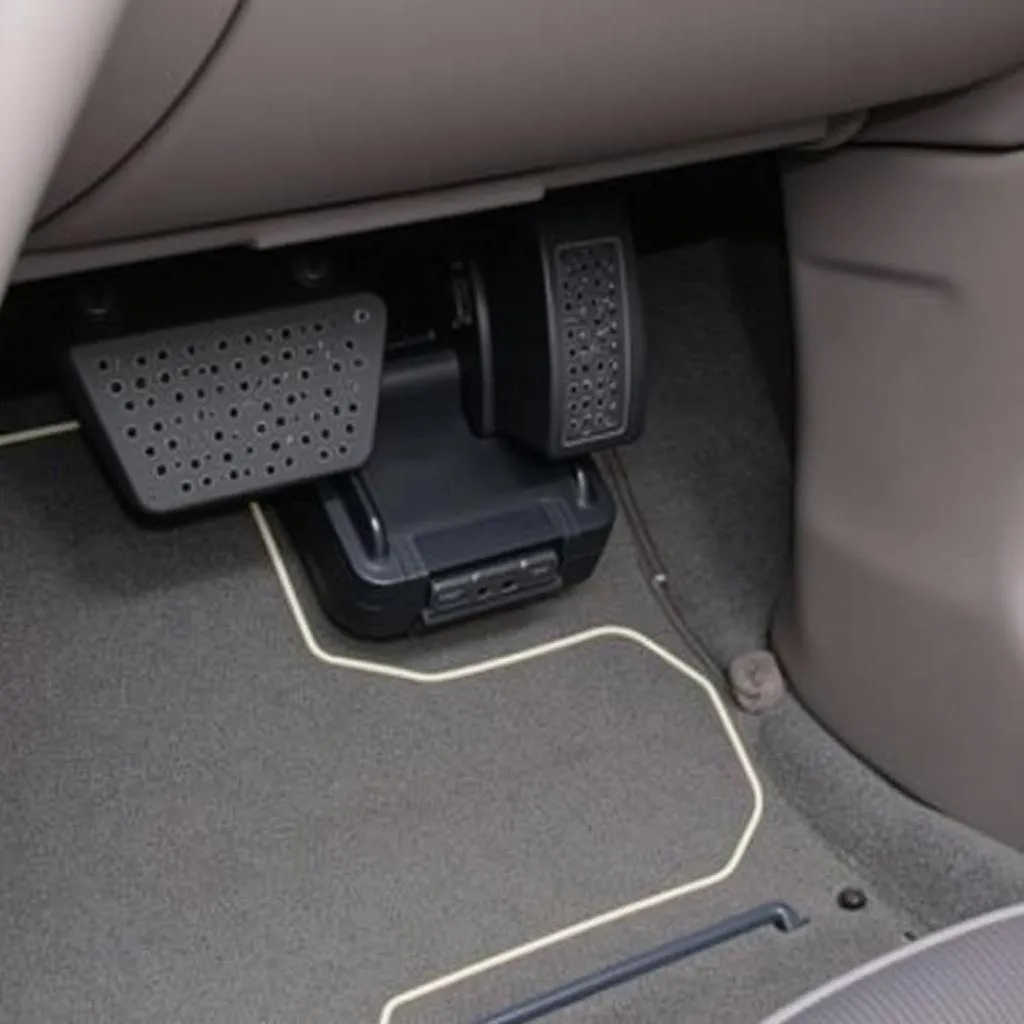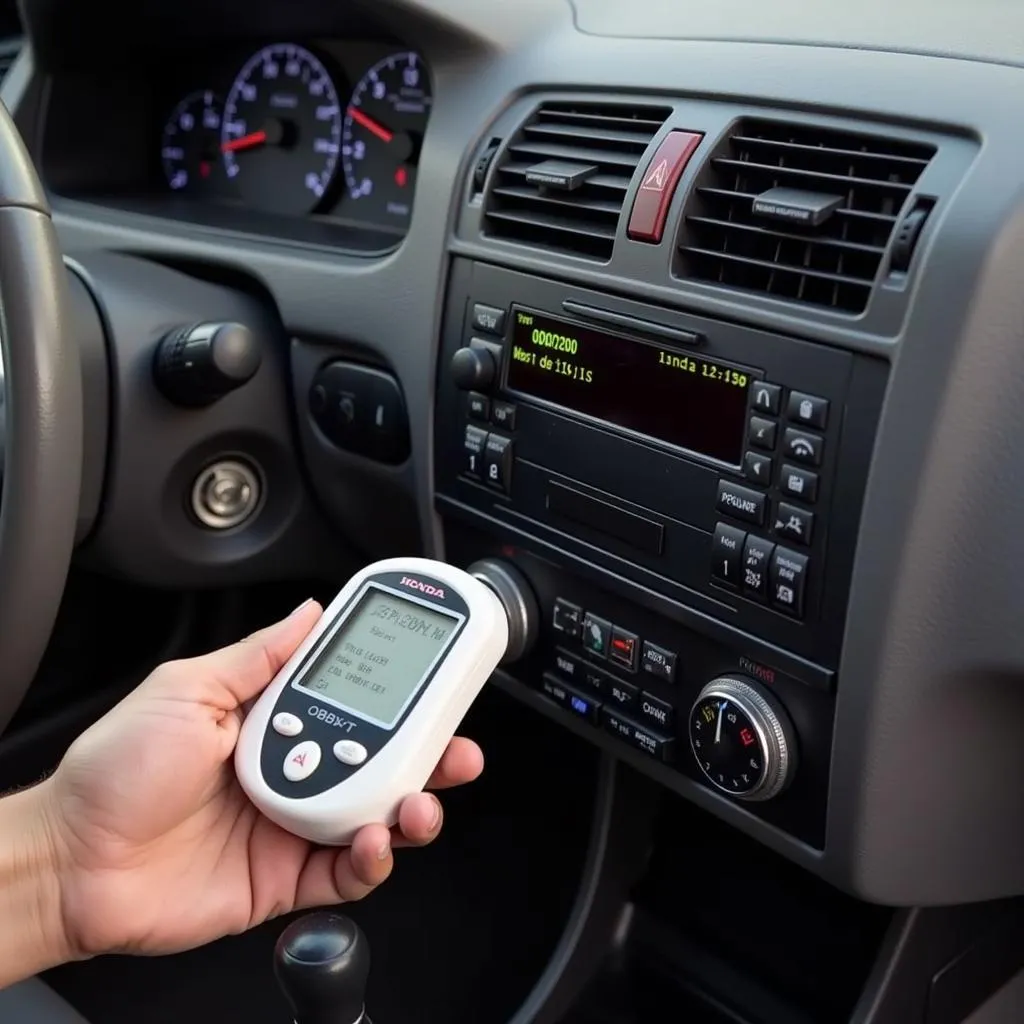The Honda Accord 2000, a reliable workhorse of its time, came equipped with an OBD-II port, a crucial interface for diagnosing engine and emission system problems. Understanding how to use the 2000 Honda Accord OBD system can empower you to address minor issues and make informed decisions about repairs.
 2000 Honda Accord OBD Port Location
2000 Honda Accord OBD Port Location
What is OBD and Why is it Important for my 2000 Honda Accord?
OBD, short for On-Board Diagnostics, is a standardized system that allows you to communicate with your car’s computer and access valuable data about its performance. The 2000 Accord utilizes the OBD-II protocol, introduced in 1996, which offers more comprehensive diagnostics and standardized connector design.
This system works by monitoring various sensors throughout your engine and emission control systems. When an issue arises, the OBD-II system stores a corresponding code in its memory, which you can access through the OBD-II port.
Where Can I Find the OBD Port on my 2000 Honda Accord?
The OBD-II port in most 2000 Honda Accords is typically located under the driver’s side dashboard, near the steering column. It’s a trapezoidal 16-pin connector, often covered by a small plastic panel. If you’re having trouble finding it, refer to your owner’s manual for a diagram.
 Connecting an OBD2 Scanner to a 2000 Honda Accord
Connecting an OBD2 Scanner to a 2000 Honda Accord
Understanding Honda Accord 2000 OBD Codes
Once you’ve located the OBD-II port, you can connect an OBD-II scanner (also known as a code reader) to retrieve the stored trouble codes. These codes are alphanumeric combinations that correspond to specific issues within your car’s systems.
For instance, a code like “P0420” on your Honda Accord 2000 OBD II port might indicate a problem with the catalytic converter system. Understanding these codes can give you a starting point for troubleshooting or discussing repairs with a mechanic.
Common 2000 Honda Accord OBD Codes and What They Mean
While numerous codes can be triggered in a 2000 Honda Accord, some appear more frequently than others. Here’s a breakdown of a few common ones:
- P0420 (Catalyst System Efficiency Below Threshold): This code typically suggests a failing catalytic converter, but it can also point to issues with oxygen sensors or exhaust leaks.
- P0171 (System Too Lean (Bank 1)): This code suggests that the engine is running lean, meaning it’s receiving too much air compared to fuel. This could be due to a vacuum leak, faulty oxygen sensor, or a fuel delivery problem.
- P0300 (Random/Multiple Cylinder Misfire Detected): This code indicates that one or more cylinders are not firing correctly. This could be due to spark plug issues, ignition coil problems, or vacuum leaks.
- P0135 (O2 Sensor Heater Circuit Malfunction (Bank 1, Sensor 1)): This code indicates a problem with the heating element in the upstream oxygen sensor on Bank 1. A faulty sensor can lead to inaccurate readings and affect fuel efficiency.
For a comprehensive list of 1999 Honda Accord OBD codes, refer to our detailed guide.
Troubleshooting Your 2000 Honda Accord Using the OBD System
While retrieving and understanding OBD-II codes is a valuable skill, it’s essential to approach the diagnostic process systematically:
- Start with the Basics: Before diving into complex diagnostics, check your gas cap for a tight seal, as a loose cap can trigger emission-related codes. Also, ensure there are no obvious vacuum leaks.
- Read the Codes: Connect your OBD-II scanner and note down all the retrieved codes.
- Research the Codes: Use online resources or a repair manual to understand the potential causes associated with each code.
- Clear the Codes: After noting the codes, clear them using your scanner. This step helps determine if the issue is intermittent or persistent.
- Test Drive: Drive your Accord for a while, replicating the conditions under which the codes originally appeared.
- Re-read the Codes: Connect your scanner again and check if any codes reappear. If so, focus your troubleshooting efforts on the systems related to those codes.
When to Consult a Professional
While the OBD system empowers you to address minor car issues, some situations warrant professional attention:
- Persistent Codes: If a code reappears despite clearing it and addressing potential causes, it indicates a deeper underlying issue.
- Complex Systems: Issues with the transmission, airbags, or other complex systems often require specialized knowledge and tools best handled by professionals.
- Lack of Expertise: If you’re unsure about a particular code or repair procedure, don’t hesitate to seek professional help.
“Relying solely on OBD codes for diagnosis is like reading a symptom list instead of seeing a doctor. It’s a starting point, not a final diagnosis,” says John Thompson, a veteran mechanic with over 20 years of experience working on Honda vehicles.
 Mechanic Inspecting 2000 Honda Accord Engine
Mechanic Inspecting 2000 Honda Accord Engine
Frequently Asked Questions about Honda Accord 2000 OBD Systems
1. Can I drive my 2000 Honda Accord with the check engine light on?
While it might be possible to drive for a short period with the check engine light on, it’s crucial to address the underlying issue promptly. Ignoring it could lead to further damage or reduced fuel efficiency.
2. Is my 2000 Honda Accord OBD 11?
Yes, all 2000 Honda Accord models are equipped with the OBD-II system.
3. Where can I find reliable information about 2000 Accord OBD location?
Refer to your owner’s manual or trusted online resources like reputable automotive forums and websites.
4. Can I reset the check engine light myself?
Yes, you can temporarily reset the check engine light using an OBD-II scanner. However, this doesn’t fix the underlying problem, and the light will reappear if the issue persists.
5. Are there any free OBD-II scanner apps available?
Yes, several free and paid OBD-II scanner apps are available for smartphones, but their functionality and accuracy can vary.
6. Can a faulty battery trigger OBD codes?
A weak or failing battery can sometimes cause voltage fluctuations that trigger various OBD codes, even if the battery isn’t the primary issue.
7. Do I need a special scanner for my 2000 Honda Accord?
While any standard OBD-II scanner can retrieve basic codes from your Accord, some advanced scanners offer more in-depth diagnostics and model-specific functionalities.
For information on OBD codes specific to other Honda models, like the Honda CRV 2007 OBD codes, explore our comprehensive resources.
Need Help with Your Honda Accord 2000 OBD System?
Navigating the complexities of automotive diagnostics can be overwhelming. If you need assistance understanding your Honda Accord 2000 Obd system or require professional help, contact us via WhatsApp: +1(641)206-8880, Email: [email protected], or visit us at 276 Reock St, City of Orange, NJ 07050, United States. Our expert team is available 24/7 to answer your questions and provide top-notch car care solutions.
